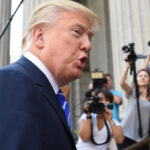Clay Travis, a radio host and the founder of sports media website Outkick.com, testified to Congress on Friday about the power of Big Tech censorship, accusing Facebook of “content-based speech discrimination” against his media company.
Travis was invited by the House Judiciary subcommittee on antitrust, commercial and administrative law to speak to the relationship Big Tech shares with the media as Congress considers legislation that would allow media outlets to collectively negotiate ad rates with tech companies like Google or Facebook.
In his opening statement, Travis provided the subcommittee with examples of how Facebook allegedly punished Outkick’s traffic for posting positive coverage of former President Donald Trump and heterodox opinions from medical experts on COVID-19 lockdowns.
On August 11, President Trump was a guest on Travis’ radio program, joining the show to discuss the importance of playing college sports in the fall. Articles covering what the president said about the NBA, the NFL, and college sports were published on Outkick’s website.
“The day after that interview Facebook tanked our traffic,” Travis said. “The next day and over the next week, Facebook removed 68% of our audience, 76% of our new users. That cost my company hundreds of thousands of dollars.”
Travis provided documents to the subcommittee showing the precipitous decline in Outkick’s traffic during the timeframe he mentioned.
“To me, it was clear content-based speech discrimination,” Travis said. “Facebook didn’t like that we had the president of the United States on our radio program and they also didn’t like that the majority of the coverage of that interview was positive, which as a sports fan, it’s hard to be negative when the favor of the president is aligned with games actually being played.”
He warned Congress of the “overwhelming power” that Big Tech holds over media companies, giving a second example of how he says Facebook discriminated against certain speech.
In February, Outkick published an article covering an op-ed in the Wall Street Journal by Dr. Marty Makary, a professor at Johns Hopkins School of Medicine & Bloomberg School of Public Health. In the op-ed, Makary argued that herd immunity was responsible for COVID-19 cases falling and predicted that the United States would reach herd immunity against the virus sometime in April.
“Certainly some scientists and doctors agree with that, certainly some scientists and doctors disagree with that opinion. We wrote about that editorial opinion on our website,” Travis said. “Within a matter of days, we received a notification from Facebook with the downright Orwellian subject, ‘Important Notification: Misinformation Violation.’ Facebook told us we were not allowed to share the opinion of a doctor on our website because they said it was a fact-checked inaccuracy.
“It was, members of the subcommittee, AN OPINION. An opinion of a reasoned and well-learned doctor. That is what the scientific method is, we argue about what the truth is in this country with an idea that we reach a better conclusion. Facebook’s own fact-checkers labeled our article about an opinion to be factually inaccurate, which is an impossibility.”
He continued: “Who checks the fact-checkers? Our traffic declined by 80%, as you can see, as soon as Facebook found this violation. We would all be rightly concerned if the government of the United States was making these kind of decisions. My concern is all of the Big Tech companies now have the same power that China has to regulate the internet in its country.
“Instead of the government doing it, we have allowed Big Tech to do it.”
Watch:
Here’s my opening statement at Capitol Hill today on the massive power of big tech and how it impacts @outkick. Als… https://t.co/qoV4BwuECd
— Clay Travis (@Clay Travis)1615577423.0
Big tech is so powerful they colluded to ban the president of the United States from their platforms. If they can d… https://t.co/2041aD4ir5
— Clay Travis (@Clay Travis)1615576833.0






